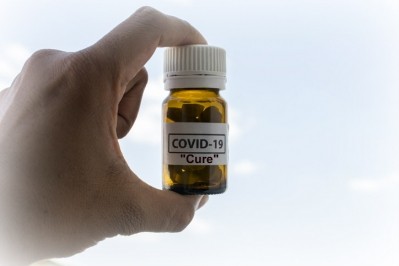New quality advocacy group brings medical, pharmaceutical groups to table with supplement industry stakeholders

The group counts as members a number of entities in the pharmaceutical and medical fields, including the Academy of Nutrition and Dietetics, the American Pharmacists Association and the Children’s Hospital of Philadelphia. Also among the ranks are other advocacy groups such as National Consumers League and the Obesity Society.
Longstanding quality problems put users at risk
Joseph Nadglowski, president and CEO of a patient advocacy group called the Obesity Action Coalition, said his group’s interest in boosting supplement quality rests on the need for his group’s members for supplements. Following bariatric surgery patients depend on supplements for proper nutrition, as their ability to absorb nutrients from food has been compromised. As with other members of the new group, Nadglowski said his group was concerned about recurrent quality problems in the industry.
“Following bariatric surgery you are required to use supplements for the rest of your life. But we see a lot of products that are tainted with substances that are former drugs,” Nadglowski told NutraIngredients-USA..
“The DSQC is a unique collaboration of diverse organizations on the medical and scientific fields and from industry that are working together to promote safety, advance transparency and embrace quality,” he said.
Focusing on problem categories
Among FDA’s longstanding categories of concern within the universe of products m are erectile dysfunction products, muscle building supplements and weight loss products, which are points of concern for DSQC, too. FDA has cited a number of ED products for being laced with analog versions of popular pharmaceuticals such as Viagra or Cialis. In the case of muscle building products, the inclusion of artificial stimulants and/or steroid like pro hormones is the major concern. In the weight loss category, some products have been found to be laced with sibutramine, a weight loss drug that was removed from the market because there was too much risk of it causing heart problems.
Dietary supplement manufacturer Pharmavite is a member of the coalition and also sits on the steering committee. Christine Burdick-Bell, vice president and general counsel for the West Hills, CA-based firm, said it was time for there to be a voice that brought diverse viewpoints together to advocate for higher quality in the industry and to support for more vigorous enforcement on the part of FDA.
“From our perspective as an industry member, for years the industry has been saying that there are good guys and bad guys and FDA should take action against the bad guys. We think industry has to lead in that,” she said.
The group, which came together behind the scenes several years ago under the aegis of steering committee member USP, has unveiled a policy statement about what it hopes to accomplish. The statement is divided into three sections, titled Promote Safety, Advance Transparency and Embrace Quality Mechanisms.
Among the specific things group advocates for are:
- Strengthen and clarify FDA’s authority over product marketed as supplements that contain hidden drug ingredients
- Strengthen adverse event reporting systems
- Require a mandatory product listing mechanism for all dietary supplements
- Expand the amount of information on product labels
- Support industry efforts to increase validation of suppliers and testing of ingredients and to foster retailer/manufacturer due diligence.
Untangling the regulatory web
Burdick-Bell and Nadglowski said it has been sometimes frustrating to see the way in which from their perspective the enforcement against products marketed as dietary supplements that contain illicit drug ingredients is hampered by vague and overlapping spheres of federal authority. If it contains a drug ingredient, is it still a supplement? Who should take the lead, the Center for Food Safety and Nutrition (CFSAN)? Or FDA’s Center for Drug Evaluation and Research (CDER)? How about if it contains a drug ingredient, but is making no disease treatment claims?
“If you have a product tainted with an FDA-approved drug ingredient, suddenly you are handing that off to CDER. You really need to clarify what that looks like moving forward,” said Nadglowski.
Burdick-Bell advocates for something the group is calling heightened ‘interoperability’ among government agencies so there are fewer cracks into which such category-bending products could fall. This could also strengthen the adverse event reporting system by making the information gleaned in the collection of those reports more widely available among government agencies.
CRN: Opportunity to educate and work with diverse stakeholder group
Including Pharmavite, another members from the industry include the American Botanical Council and the Consumer Healthcare Products Association (CHPA). Joining Pharmavite on the group’s steering committee is the Council for Responsible Nutrition. Steve Mister, president and CEO of CRN, said his group was involved from the start. Mister emphasized his comments on DSQC’s public debut were made from CRN’s perspective and that he was not speaking for the group as a whole.
“This is not another trade organization. I don’t look at this as another voice that will compete with the five that are already out there. This is a way for industry to talk to other stakeholders as part of the wider coalition we will need if we are to do anything legislatively with regard to the dietary supplement industry, such as what would DSEHA 2.0 look like, or what a mandatory product listing should look like,” Mister said.
Among the input Mister said CRN provided were primers on GMPs and adverse event reporting. Even among the some of the other influential and highly educated members of the group, the existence and comprehensiveness of these requirements came as a surprise, Mister said.
“Some of the other people who represent the consumer side had no idea how elaborate the regulations were. This was the first time they had been in a room with people from industry to hear the other side,” he said.
Mister said CRN did a quick survey of members in the room to see what the perceptions of the dietary supplement industry. Clearing up such misunderstandings will be necessary to form a unified front with legislators and the public, he said.
“It was insightful to see the perspective and in some cases the baggage that these organizations brought in to that room. There was a lot of distrust of the dietary supplement industry and a lot of misinformation,” he said.
To read the full DSQC policy statement, click here.








